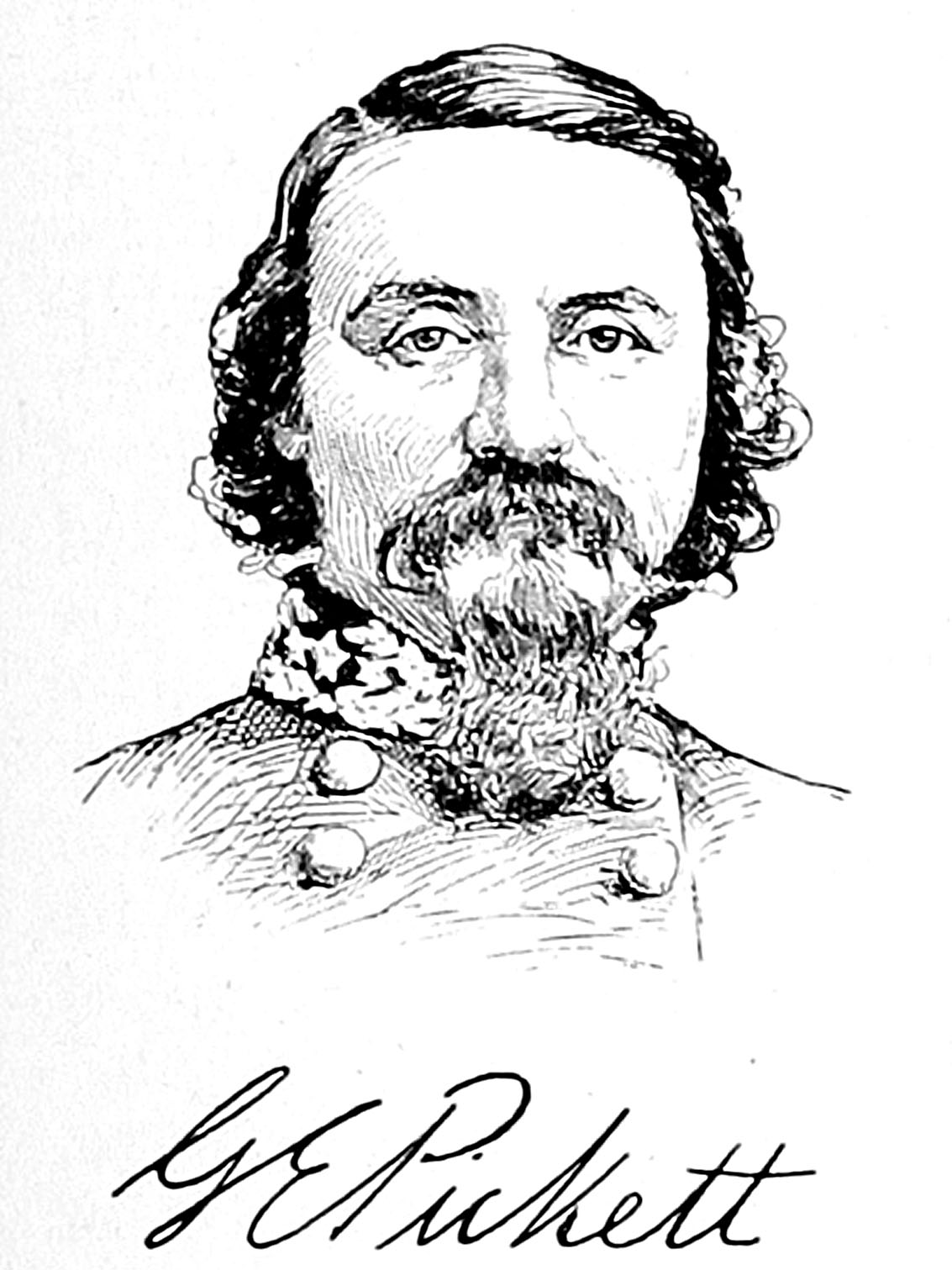Appleton's Cyclopaedia of American Biography
by James Grant Wilson and John Fiske, 1900
George E. Pickett

PICKETT, George Edward, soldier, b. in Richmond, Va., 25 Jan., 1825; d. in Norfolk, Va., 30 July, 1875. His father was a resident of Henrico county, Va. The son was appointed to the U. S. military academy from Illinois, and graduated in 1840. He served in the war with Mexico, was made 2d lieutenant in the 2d infantry, 3 March, 1847, was at the siege of Vera Cruz and was engaged in all the battles that preceded the assault and capture of the city of Mexico. He was transferred to the 7th infantry. 13 July, 1847, and to the 8th infantry, 18 July, 1847, and brevetted 1st lieutenant, 8 Sept., 1847, for gallant and meritorious conduct at Contreras and Churubusco, and captain, 13 Sept., for Chapultepec. he became captain in the 9th infantry. 3 March. 1855, after serving in garrisons in Texas from 1849. and in 1856 he was on frontier duty in the northwest territory at Puget sound. Capt. Pickett was ordered, with sixty men, to occupy San Juan island then, during the dispute with Great Britain over the north- west boundary, and the British governor, Sir James Douglas, sent three vessels of war to eject Pickett from his position. He forbade the landing of troops from the vessels, under the threat of firing upon them, and an actual collision was prevented only by the timely arrival of the British admiral, by whose order the issue of force was postponed. For his conduct on this occasion Gen. Harney in his report commended Capt. Pickett "for the cool judgment, ability, and gallantry he had displayed," and the legislature of Washington territory passed resolutions thanking him for it. He resigned from the army. 25 June. 1861, and after great difficulty and delays reached Virginia, where he was at once commissioned colonel in the state forces and assigned to duty on Rappahannock river. In February, 1862, he was made brigadier-general in Gen. James Longstreet's division of the Confederate army under Gen. Joseph E. Johnston, which was then called the Army of the Potomac, but afterward became the Army of Northern Virginia. His brigade, in the retreat before McClellan up the peninsula and in the seven days' battles around Richmond, won such a reputation that it was known as "the game-cock brigade." At the battle of Gaines's Mills, 27 June, 1862, Pickett was severely wounded in the shoulder, and he did not rejoin his command until after the first Maryland campaign. He was then made major-general, with a division that was composed entirely of Virginians. At the battle of Fredericksburg this division held the centre of Lee's line. For an account of Pickett's charge at Gettysburg, 3 July, 1863, see the articles LEE, ROBERT E., and MEADE, GEORGE G. Pickett was afterward placed in command in lower Virginia and eastern North Carolina. In May, 1864, he defended Petersburg and saved it from surprise and capture by Gen. Benjamin F. Butler. ; In the attack on Gen. Butler's forces along the line of the railroad between Richmond and Petersburg. Pickett's division captured the works. Gen. Lee, in a letter of thanks and congratulation, dated 17 June, said: "We tried very hard to stop Pickett's men from capturing the breastworks of the enemy, but could not do it." At Five Forks his division received the brunt of the National attack, and was entirely disorganized. After the war Gen. Pickett returned to Richmond, where he spent the remainder of his life in the life-insurance business. His biography by Edward A. Pollard is in Pollard "Life and Times of Robert E. Lee and his Companions in Arms" (New York, 1871). See also "Pickett's Men," by Walter Harrison (1870).
PICKETT, George Edward, Appleton's Cyclopaedia of American Biography by James Grant Wilson and John Fiske, 1900, Vol. 5 Page 5.